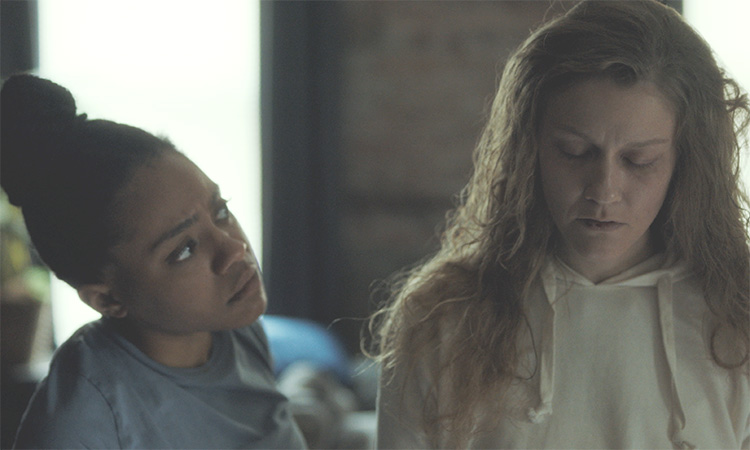The Harbinger is a film of virus, infection and masks. It is set in the early wave of the pandemic when there was no vaccine and the Coronavirus was decimating New York City’s elderly and middle-aged populations.
Monique ‘Mo’ Cartwright (Gabby Beans) and her brother Lyle (Myles Walker), both adults, have moved back in with their widowed, immuno-compromised father Ronald (Raymond Anthony Thomas) who lives upstate near Binghamton. Forming a tight bubble to keep Ronald safe, the family’s three members have locked down and spent long periods of time together – but there is also a fourth presence in the house. “I know your mother’s here,” says Ronald, of his late wife. It is not just her urn, prominently on display by her picture, but a rich nexus of loving associations that keeps her alive, at least in the minds and memory of her kin. She is, after all, part of who they are, and has left an indelible trace in their lives.
Still, old college mate Mavis (Emily Davis) whose intervention once saved Mo’s life during a suicidal mental breakdown, calls to reclaim this debt of friendship, summoning Mo from her rural domestic idyll back to ‘Ground Zero’ of a City in lockdown. Although there is a Covid case in her apartment building, it is not Coronavirus that afflicts Mavis, but rather a peculiar sleep disorder that sees her struggling to wake from nightmares which all feature a terrifying figure, significantly wearing a plague mask.
The dreams also leave Mavis dreading that she is about to be completely obliterated from memory. “I’m not ready to be forgotten,” are Mavis’ opening words in the film. Now that Mo, who has never forgotten her friend, comes to stay, she too starts having similar dreams, and similar anxieties about no longer being remembered. Their desperate zoom call to the medium – and mother of two – Wendy (Laura Heisler) leads to a tale of an elusive creature, known as the Harbinger, an “off the record, unpublished myth” which lodges into people’s heads as a ‘bad idea’ that is impossible to shake, then hijacks their dreams before taking them forever, and leaving practically no trace of them behind in the collective memory.
The Harbinger is also, like Covid, a communicable condition, spreading through being storied (verbally, online, etc.), and erasing its own path of transmission by eventually eradicating all trace of its carriers. This gives rise to an unnerving paradox of reception. Merely by looking at the Medusa of ancient myth, people would be turned to stone – which makes visual representations of the Medusa come with a special frisson for any viewer.
Similarly in The Nightmare (2015), one interviewee makes clear that he contracted sleep paralysis (the subject of the documentary) merely by hearing about it from someone else, which raises the possibility that Rodney Ascher’s film is itself helping spread to viewers the very problem that it highlights. Likewise with The Harbinger, writer/director Andy Mitton (YellowBrickRoad, 2010; We Go On, 2016; The Witch In the Window, 2018) flirts with the idea that he is giving us a perilous peek at something that should never be seen, and implanting in our own minds a seed that we may never be able to dislodge, and that may be our own undoing.
As Mavis and Mo struggle through their dreams to resist the Harbinger’s inexorable, inevitable advance, The Harbinger places itself in the tradition of films like J.S. Cardone’s The Slayer (1982), the A Nightmare on Elm Street franchise, Mike Flanagan’s Before I Wake (2016) and Michael Venus’ Sleep (2020), all of which focus on their characters’ hypnic and oneiric states as a way of surreally externalising internal anxieties.
Yet this is also a film of the here and now, tapping into our fears of alienation, annihilation and oblivion in an age of enforced distancing, deadly disease and increasingly virtual existences lived online, where we easily become susceptible to more than one kind of virus.
The possible future that Mavis and Mo are facing and fighting – one of utter, anonymous erasure – matches Ronald’s own concerns with what would likely have happened to him if he had not enjoyed the close support of his loving children. “Without you,” Ronald tells Mo and Lyle, “I’d probably be huffing on a respirator at Binghamton General right now.” Such a lonely end, though here certainly fictionalised, is not so very far removed from the fate that was met by many thousands of people during the pandemic, taken suddenly and without proper closure, and now reduced merely to impersonal statistics.
In dramatising, through grounded, believable characters, this existential angst about our own mortality and how little we leave behind in the end, Mitton has once again crafted a moving if grim parable for our (and all) times, where everything good and worth holding onto in life may just be part of a greater nightmare of emptiness. Worming itself into your brain and clinging there long after its hauntingly bleak finale has unfolded, The Harbinger is a real humdinger, or Har-banger, that you will not soon forget.
The Harbinger has its world première at Fantasia 2022. Find more SciFiNow reviews here.
